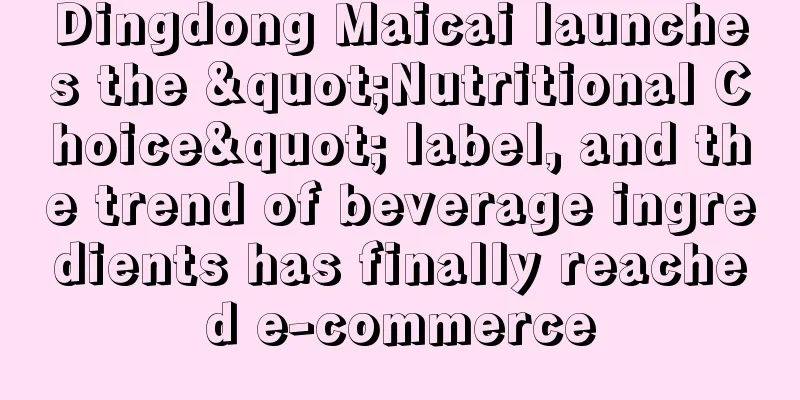Dingdong Maicai launches the "Nutritional Choice" label, and the trend of beverage ingredients has finally reached e-commerce

The first self-operated instant e-commerce store to launch the "Nutritional Choice" logo has appeared. On March 24, under the guidance of the Shanghai Municipal Health Commission, the Shanghai Center for Disease Control and Prevention announced in its official WeChat account that the "Nutritional Choice" grading label for beverages developed by the center will be piloted in Shanghai. It is reported that the label can comprehensively reflect the content of sugar, fat and other ingredients in beverages. Subsequently, new tea and beverage brands such as Bawang Cha Ji, Nayuki’s Tea, Happy Lemon, and CHALI were officially announced as the first batch of “Nutritional Choice” logo pilots in Shanghai. Open the new tea brand's ordering app, select the cup type, temperature, and sweetness of the corresponding drink, and the page will show one of the four levels, ABCD. Taking Ba Wang Cha Ji as an example, a large cup of Xing Shi Chun Shan with standard ice and standard sugar is rated B, while a medium cup of Xing Shi Chun Shan with standard ice and standard sugar is rated C. Yilan Business learned that recently, Dingdong Maicai also officially launched the "Nutritional Choice" grading label, becoming the first self-operated instant e-commerce company to implement the label. Some consumers found that when they bought drinks on Dingdong Maicai, they saw a novel grade mark on the lower left corner of many drinks. Yilan Business learned that in the "Beverages" category of Dingdong Maicai APP, many carbonated drinks, functional drinks, juices, milk drinks, tea drinks and other drinks were clearly marked with the words "ABCD" in bold and enlarged form. It is reported that the first batch of 90 beverage products were marked to help consumers choose products according to their needs for ingredients. Currently, this function is being trial-launched on Dingdong Maicai’s APP and mini-program. It is expected to gradually cover all users through product updates within 2-3 weeks. With the participation of companies such as Dingdong Maicai, the application scenarios of nutritional grading standards are becoming more and more numerous, which also means that consumers' value proposition for a healthy lifestyle is being taken seriously by more links. So, to what extent can the "Nutritional Choice" grading label help consumers choose products? And what impact does it have on the e-commerce industry? 1. Nutritional grading: only a reference, not the only standardInitiatives like the "Nutritional Choice" grading label are not new. In the UK, a nutritional grading mechanism is implemented in the form of "traffic light" labels, in which the nutrient content in food is made into the shape of a traffic light, and red signs are used to remind consumers that they need to control their intake of the product; Singapore has made a beverage grading label, which divides beverages into four levels: ABCD according to the sugar and fat content in the beverages. At present, the first batch of Shanghai "Nutritional Choice" labeling pilots are mainly some ready-made beverage companies. The classification is based on the content of non-dairy sugars, saturated fats, trans fats and non-sugar sweeteners in the beverages. According to Ruan Guangfeng, deputy director of the Kexin Food and Health Information Exchange Center, the above four ingredients are all common ingredients in commercial beverages and are closely related to health. Among them, non-dairy sugars are sugars that are not lactose. Lactose mainly comes from milk, so the lactose in milk is not counted. Non-sugar sweeteners refer to sugar substitutes including aspartame and acesulfame potassium. Generally speaking, beverages with less sugar, saturated fat, and trans fat and without sweeteners can meet the standards of Class A or Class B. At the same time, the nutritional classification of a beverage depends on its shortcomings. If a certain indicator only meets the C standard, the final classification of the beverage will also be Class C. It is worth noting that this nutritional grading does not constitute the only standard for the nutritional level of a product, and there may be some misjudgments in the nutritional grading. Ruan Guangfeng explained with an example, "For example, the sugar content of freshly squeezed juice is basically above 5%, so freshly squeezed juice will be classified as C or D. Some coffee or milk tea with milk may be rated as B or C because of the saturated fat in milk. But in fact, milk contains some calcium. Drinking coffee or milk tea with milk can actually help make up for the loss of calcium. Yilan Business believes that for new tea brands such as Bawang Cha Ji that focus on "wild fresh milk tea", joining the "Nutritional Choice" logo pilot will, on the one hand, give consumers a more intuitive reference for purchasing beverages, and on the other hand, it will once again strengthen its brand label as a healthy new tea drink. For self-operated instant e-commerce companies like Dingdong Maicai, there are more issues that need to be considered. 2. Self-operated e-commerce companies use the “Nutritional Choice” labelYilan Business learned that the specific rating standards for the "Nutritional Choice" label are not in the hands of the companies. Taking Dingdong Maicai as an example, the overall process is initiated and formulated by the Shanghai Center for Disease Control and Prevention. Dingdong Maicai submits the corresponding product list and the corresponding test results. The CDC reviews and evaluates the products, and the Dingdong Maicai quality control department cooperates and supports the relevant indicators. That is, all rated products are reviewed and evaluated by the CDC, and Dingdong Maicai displays them on the product side according to the evaluation results. Unlike new tea brands that specialize in freshly brewed drinks, self-operated e-commerce companies like Dingdong Maicai have joined the "Nutrition Choice" label pilot program. Products with the "Nutrition Choice" label must come from different partners, and there may be more considerations in the process of submitting product lists. For example, a partner who receives a C or D rating may be inclined to refuse to submit their products for rating due to the impact of the rating on their sales. Therefore, when promoting the project, e-commerce companies need to reach a consensus on whether to submit such products for review. Yilan Business learned that Dingdong Maicai has not encountered much resistance from its partners. In the past two years, Dingdong Maicai has been advocating and practicing the concept of developing cleaner and healthier products among suppliers and consumers. Therefore, most of Dingdong Maicai's partners share the same development values as Dingdong, allowing this logo project to proceed smoothly. So, will the sales of products rated D be affected? Will the sales of products rated A increase as a result? Because nutrition labeling is still in its early stages and product updates are still ongoing, Dingdong Maicai cannot give a definite answer for now. However, based on its early evaluation of the project, it is expected to have limited impact on the overall sales of the category, and is more confident in the sales growth of beverage products with A and B labels. Yilan Business noticed that in its wine and beverage category, sugar-free tea drinks including Nongfu Spring Oriental Leaves and Suntory sugar-free oolong tea have all been listed with an A-rated health label; while sugary concentrated fruit juice drinks such as the Water-soluble C Blood Orange Flavored Compound Drink and NFC Orange Juice, which are also under Nongfu Spring, have not yet been listed with a health label. From this, we can infer that from the perspective of companies such as Nongfu Spring, the launch of nutrition labeling is a double-edged sword for their products. On the one hand, products that receive an A in the nutrition labeling rating standard are labeled as "healthy drinks" to consumers to a certain extent, and sales will increase as a result. On the other hand, some products with high sugar content, such as concentrated juice, are still waiting to see this move because the ratings they receive may not be impressive. In any case, in the post-epidemic era, people are paying more and more attention to health, and more and more consumers are paying attention to the source of beverage ingredients, seeking products that are both healthy and tasty. Based on this trend, whether it is Dingdong Maicai at present, or other e-commerce platforms that may launch nutrition grading labels in the future, in the process of purchasing new products, it is necessary to reach more consensus with suppliers in this regard. Author: Li Yan, Editor: Muyu WeChat public account: Yilan Business |
<<: Workers encounter overbearing leaders: obedient, taking the blame, and always available
Recommend
The “Poor Man’s Meal” is selling well. Are merchants making a profit or a loss?
Why can the "poor man's meal" enter ...
When is Amazon Prime Day? When is Prime Day?
Just like JD.com's 618 store anniversary, Amaz...
Who will bear the THC cost? In what cases will the customer bear the cost?
Nowadays, more and more people choose to buy goods...
The “A and B” sides of the tea beverage industry: Who is failing? Who is running wild?
The tea beverage industry is facing unprecedented ...
What is the value of Dong Yuhui’s “small essay” copywriting?
Recently, the "small essay" incident bet...
Less than a year after testing the waters, ByteDance shut down multiple interactive drama businesses
Due to business adjustments, several exploration I...
Must learn! Xiaohongshu released [Store Broadcast 3+3 Management Method]!
Xiaohongshu has just released the "Simple Liv...
How do Shopee buyers modify their reviews? Will they default to positive reviews?
After a Shopee buyer buys something in a store, if...
E-commerce platform advertising war: Shake ads provoke Apple to fight back
As the Double Eleven shopping spree came to an end...
It's 2024, and Simba Xiao Yangge hasn't been "fried" enough
In the fierce competition of live e-commerce, the ...
Marketers' business thinking
In the workplace, having a say will bring you a be...
As an emotional mentor for millions of netizens, how does @陶白白Sensei maintain his high popularity?
In the fast-paced modern life, many young people l...
Everyone can create their own personal IP, and IP is worth everyone's effort
With the development of the Internet, it is no lon...
What is Amazon's customer service phone number? Where can I contact customer service?
Like Taobao, Amazon also has official customer ser...
Top 10 marketing failure cases in 2023, don’t fall into the trap of brand marketing again!
This article reviews the marketing strategy failur...









